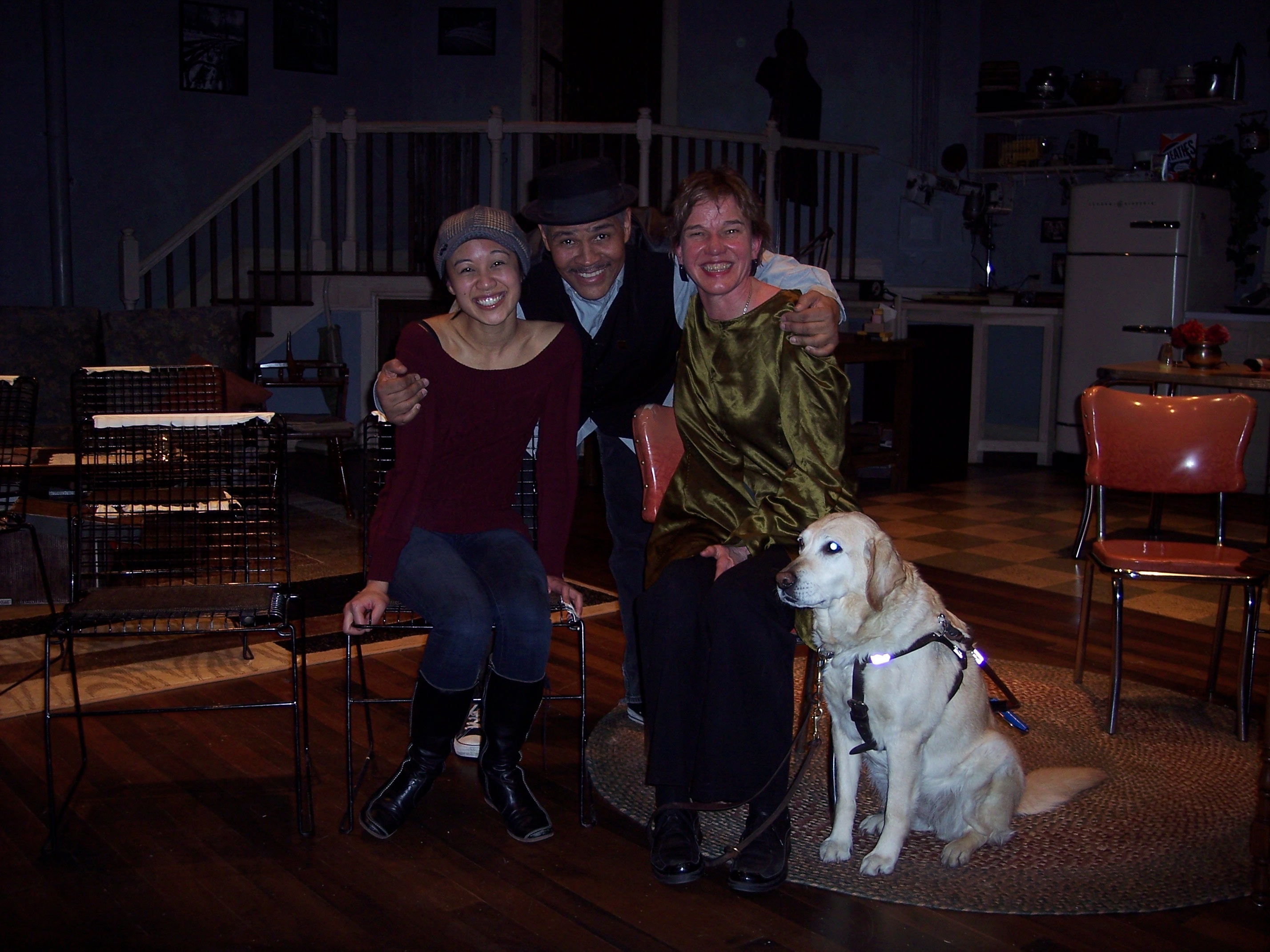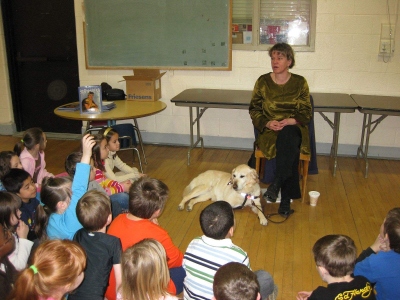
That's Emjoy Gavino (the actress who plays Susy, the blind woman), Ron OJ Parsons (the director), me, and Hanni, of course. We're on the set of Court Theatre's production of "Wait Until Dark."
If you’ve read my past couple of posts, you know that I am, ahem, a technical consultant for the upcoming production of Wait Until Dark at the Court Theatre in Chicago.
The stage is set up for previews now, and last Tuesday stage management invited me to come and check it out. Emjoy, the actress playing the blind woman, introduced me to the set. She and Ron Parsons, the director, asked lots of questions during my tour, mostly just to confirm they were doing the blind stuff right — not just waving a hand wildly over a tabletop, for example, but coming at it from the bottom first, then gently, gently brushing over the top to find what you’re looking for. That sort of thing.
They’d had a few preview nights already, and audience members were invited to stay after for a question and answer session. A question from one audience member was really bothering Ron. Seems there’s a scene in the play where the thugs are in the apartment, standing still, not breathing. The blind woman is on the phone, nearly two feet away from one of the actors, but she doesn’t notice he is there.
The audience member said the cast lost him right there. He said there was no way the blind woman wouldn’t know the thug was there — he was just two feet away. The guy in the audience didn’t believe anything in the play after that.
These theater people are going to have a hard time pulling this play off, I’m afraid. So many people have pre-conceived notions about the blind — that we have superpowers, we can hear things others don’t perceive, if someone is near us we can just feel their presence. “I told that guy in the audience that Beth Finke told us she wouldn’t know!” Ron said. That made me laugh. Beth Finke, expert in all things blind.
Ron wanted to do an experiment to prove his point. He’d have the actors stand still at different parts of the stage. “Would you mind coming up, walking around, let us know when you can tell where they are?” I didn’t mind, I mean, it was a weird idea — kind of like playing “Marco Polo” on dry ground. And without the “Polo.” But hey — I was the technical consultant. I was there to help.
I got on stage. After getting my bearings, I started walking around, just a few steps at a time. I was grateful that Emjoy had taken such care describing the set — I felt somewhat familiar with my surroundings. And I’d come to know the cast well enough by then that I could trust that someone wood stop me if I got too near the edge.
By the time our game was over, I hadn’t found a single actor. Oh, except for one — he was standing near the coat rack. I reached out to feel the coats, and felt an arm instead. Scary!
Truth is, if I hadn’t been told to try to hear the actors on stage, I would have never ever in a million years known they were there. Even knowing I was supposed to find them, I’d lost that hide-and-seek round.
After the experiment was over, and they started breathing and moving around normally, I had a better sense of where everyone was. An actor who’d been standing in a closet said the experiment unnerved him. “That was freaky! You were looking RIGHT at me! You looked me right in the eyes!” He said his heart raced when I was so close to him. “I can’t believe you didn’t hear my heart beating!”
A few more questions from different cast members, a few more experiments with sounds — can you hear the blinds? Do you notice different footsteps? — and it was break time. Time for me to go home.
As I stood waiting for someone to lead me out of the theatre, I started preparing myself mentally for the hangover I was sure to have once I got home. It happened every time — after the first rehearsal where we sat around the circle, and then again after the two visits with Emjoy. I’m just not used to thinking about my blindness so much. I mean, of course I know I’m blind, but I just don’t focus on that when I’m out and about.
And so, as exciting as it was to be the center of attention at the theatre for a while, to have very smart people ask me all sorts of questions about the things I do, and to realize I can show these very smart people something they couldn’t figure out for themselves, even if they put blindfolds on, well… those guys can get off the stage, quit acting once the play is over every night. I can’t.
I was lost in those thoughts when the actor I’d “looked” at right in the eye interrupted me. “It must be sort of Zen, being blind.” he said. I’d never thought of it that way, but that notion brought me back to thinking about the benefits of not being able to see. I can’t judge people by what they look like. I can only judge on what people say, and what they do. When I walk with others, I hold their arms. It’s more intimate. I never ever had a dog before I lost my sight. I love my Seeing Eye dog. I used to rely on sheet music, now I’m a better jazz musician –I play the piano by ear. The list of benefits goes on and on, and this actor had just brought up a new one.
People who can see are distracted. Too much in their way. Big screen TVs. Magazines at grocery check-out lanes. Billboards. YouTube. iPhones. I told the actor he was right. It is Zen-like. “I’m relieved of vision,” I said. “I have more time to think!”


